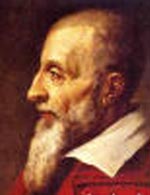Gallery of Philologists
Joseph Justus Scaliger
5 Aug 1540 - 1609
"I was born," says Scaliger in an autobiographical sketch, helpfully relieving the present compiler of having to decide how to introduce him, "at Agen, in Guienne, in the year 1540, on the fourth of August, fourteen hours after noon; so that my birthday is reckoned the fifth of August, civil time. My natal year is notable in all chronicles and annals for fierce summer heat, and a vintage burned up by the sun. Only where the grapes are usually sour, as in Switzerland and other cold countries, the wine ripened marvelous well."
Scaliger was the most learned man of his time, a time of massively learned men, and he set about it early and with enterprise. At nineteen, having previously been schooled by his father Julius Caesar Scaliger in Latin, including Latin composition, he went to Paris to learn Greek. "After attending the lectures of Adrian Turnebus for two months," he tells us, "I found I was throwing all my work away, because I had no foundation. I secluded myself, therefore, in my study, and shut in that grinding-mill, sought to learn, self-taught, what I had not been able to acquire from others. Beginning with a mere smattering of the Greek conjugations, I procured Homer, with a translation, and learned him all in twenty-one days." Then on to the rest of the poets, and the rest of the literature. This required two years, after which he went on to the study of Hebrew.
His early works were controversial, in the aggressive style of the period. They brought him recognition, but he was hampered by another personal trait: as a Protestant, he was hounded over the French countryside during one of the periods of Catholic assertiveness, and took refuge for some months in the mansion of a nobleman friend. Looking back later on these years of uncertainty, he was to write:
"If, as we are well aware, our work on these authors has not satisfied learned readers, my excuse is the whole desultory tenor of my life, and the lack of that leisure which is the chief nutriment of studies."
It was these restless conditions that disposed him, on receipt of a second invitation, to move to Protestant Leiden, accepting a position entirely without teaching duties, where he quickly became the chief ornament of that then new University, and taught - but by conversation and example - several of the brightest lights of the coming scholarly generation.
He was early interested in the chronology of universal history, a subject arising out of the Biblical question of how many years it had been since the creation of the world. Scaliger took this topic into new areas, making what use he could (and perhaps more than a modern Scaliger might think justified) of ancient Near Eastern traditions. His gift for acquiring languages did not desert him in these ventures, though he seems to have stopped short of giving serious consideration to what was then available to him of Chinese chronological traditions.
His sense of the grand structure showed itself in other ways as well. Not content to have pioneered the study of Old Latin, Scaliger sought to compile, or to have compiled, a complete corpus of Latin inscriptions. Neither this nor much else that he began was finished by himself, or by anyone else within his lifetime. But to him belongs credit for seeing that these jobs needed doing, and for finding hands to help with at least the first stages of doing them. By his organizational skills, Scaliger multiplied himself. The later world of learning, down to the present time, is partly the map of those efforts.
His own life ended in illness. Ejected, like Arthur Waley in a later century, from the lodging in which for years he had found a congenial place to work, he made the best arrangements he could, and died leaving most of his personal possessions to a few valued colleagues, and to his servant. His books, with his own detailed annotations in the margins, are still preserved in a special collection at Leiden.
The present writer, on 17 September 2003, offered to a Leiden University audience a lecture dedicated to the memory of Joseph Scaliger. It concluded thus:
I here come to the end of what I felt there would be time to share with you, from this work still in progress. I noted at the outset that my talk was offered as a token of homage to Joseph Scaliger. Let me conclude by thanking those present, for patiently assisting in that gesture of respect. I will do so by quoting the words of Dominicus Baudius, at the end of his funeral oration for Scaliger, on 26 January 1609:
"Finally, as custom and duty prescribe, I thank this most honorable assembly, that you have seen fit to honor with your attendance this address of mine, which is not an example of understanding or eloquence, but the last service of devotion to the spirit of a man who was pre-eminent in all ages, in every kind of humanistic learning."
Readings
- Anthony Grafton. Joseph Scaliger.
1 Dec 2005 / Contact The Project / Exit to Gallery Index Page
